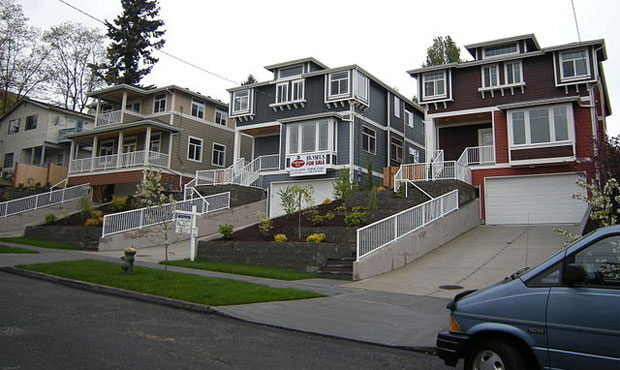Seattle begins to lay foundation for new approach to single-family zoning
Jul 23, 2021, 5:28 AM

A row of homes in Seattle. (Joe Mabel, Wikimedia Commons)
(Joe Mabel, Wikimedia Commons)
As Seattle city leaders begin to weigh potential plans for reimagining its single-family zoning, stakeholders and councilmembers gathered Thursday to discuss their goals for the future.
Seattle and Tacoma weigh changes to single-family zoning
The panel — led by Councilmembers Tammy Morales and Teresa Mosqueda — brought in leaders from a variety of local groups to kick off the conversation, and ultimately start a dialogue on the shape of the city’s neighborhoods in the years to come.
“This is the beginning of a years-long process, but we thought it was really important to start it right by engaging with the community,” Morales noted.
This also comes in the wake of proposed legislation from Mosqueda and fellow Councilmember Dan Strauss, which would effectively do away with the term “single-family zoning” altogether, and replace it with “neighborhood residential zoning.”
While it won’t actually change the makeup of Seattle’s housing density in the near-term, the larger goal revolves around taking the first step toward a precise, well-researched long-term roadmap.
“We cannot underplay the impacts of a comprehensive plan — it should not be rushed,” Puget Sound Sage Equitable Development Manager Ab Juaner said during Thursday’s panel. “This is about the health and welfare of our cities and communities.”
Emphasizing that need for thorough planning, Juaner warned against the potential fallout of quickly upzoning single-family areas without providing resources to make those neighborhoods affordable once denser housing arrives.
How to ‘sympathetically’ upzone single-family neighborhoods
“You can imagine a Seattle where multifamily development is brought up in single-family zone areas that is still so expensive that BIPOC communities are still not able to afford them,” they pointed out.
As for how Seattle can mitigate against that, it largely boils down to addressing the city’s growing problems with affordability, as well as targeting untapped areas where housing can be expanded.
“We’ve looked at the Ballard areas, SoDo, South Park, Georgetown — talk about low hanging fruit,” said Maria Guadalupe Ramirez, Duwamish Valley Affordable Housing Coalition Chair. “There’s space there that we need to make affordable for folks, or make it safe for the industry that’s still there.”
In the meantime, Seattle city leaders plan to continue engaging with local communities in the months and years to come, with the goal of shifting the city’s zoning and housing infrastructure in a more equitable and affordable direction.
You can watch Thursday’s full panel discussion here.












